Verdict
The Amazfit Cheetah Pro is a solid first attempt at a dedicated running watch that crams in a lot of features into an attractive and comfortable design. If Amazfit can get that software looking as good as the hardware then it might have a bit of a winner here. Right now, it needs a bit of finessing to compete with the running watch elite.
Pros
- Nice look and comfortable to wear
- GPS tracking performance
- Good battery life
Cons
- Heart rate at high intensity
- Some off software quirks
- Busy watch software and companion app
-
150+ sports modesGreat variety of sports modes, incluing outdoor running, treadmill, traithalon, HIIT and more.
Introduction
The Amazfit Cheetah Pro is Amazfit’s first attempt at making a watch for runners. Joining the Cheetah Round and Square, the Pro sits at the top of that trio, offering a bigger screen and nicer design materials.
The features available for runners are basically the same as the cheaper Cheetah, including a dual-band GPS antenna for improved outdoor tracking accuracy, the ability to upload routes, access to the AI-powered running coach and all the metrics you’d expect to find.
At £299.90/$300, it’s competing with running watches like the Garmin Forerunner 255 and the Polar Pacer Pro. I can also factor in watches like the Huawei Watch GT Runner. So it’s got some competition to be crowned the best midrange running watch. Does it deliver the goods? Here’s my take.
Design and screen
- AMOLED with up to 1000 nits brightness
- Titanium alloy bezel
- Waterproof up to 50 metres
The first good thing about the Cheetah Pro is that it doesn’t feel like a carbon copy of other running watches. Yes, there are elements that are similar, like materials used, but it does feel like an attractive running watch in a mostly unique way.
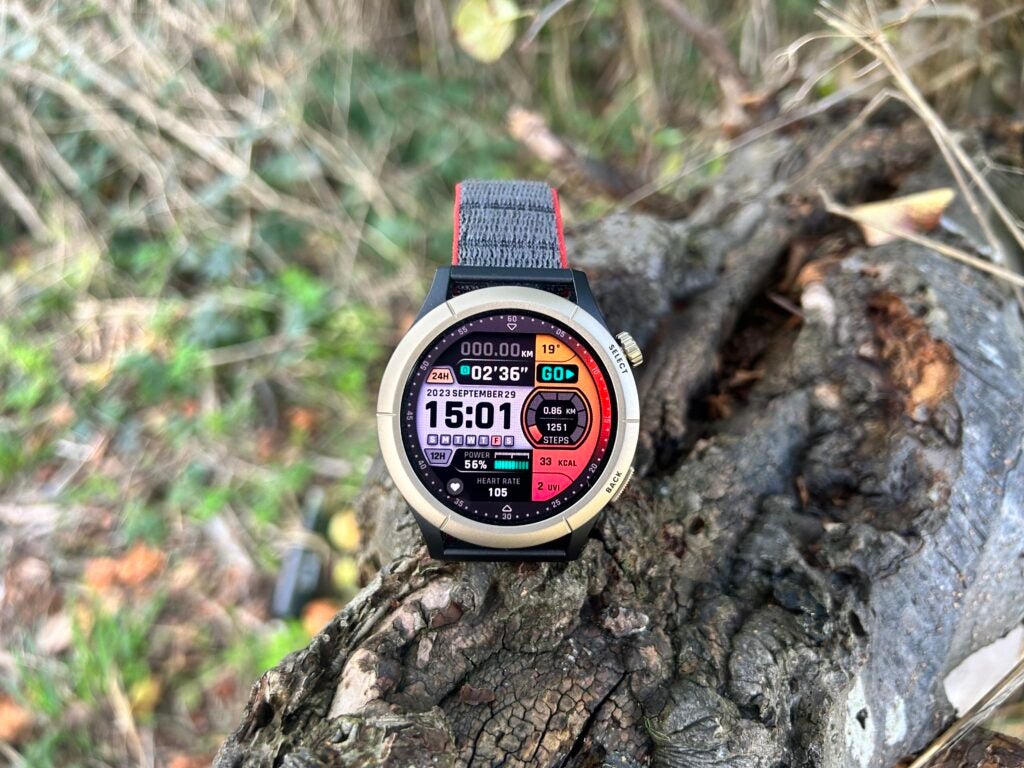
You’re getting a 47mm polymer case with a pretty showy titanium alloy bezel on top, surrounding a nice-sized and good quality 1.45-inch, 480 x 480 AMOLED touchscreen display.
It promises up to 1000 nits of brightness so is not as bright as the latest Apple Watch Ultra 2, but still ensures visibility overall in most conditions is very good. That’s protected with Corning Gorilla Glass 3 and as a package is waterproof up to 50 metres.
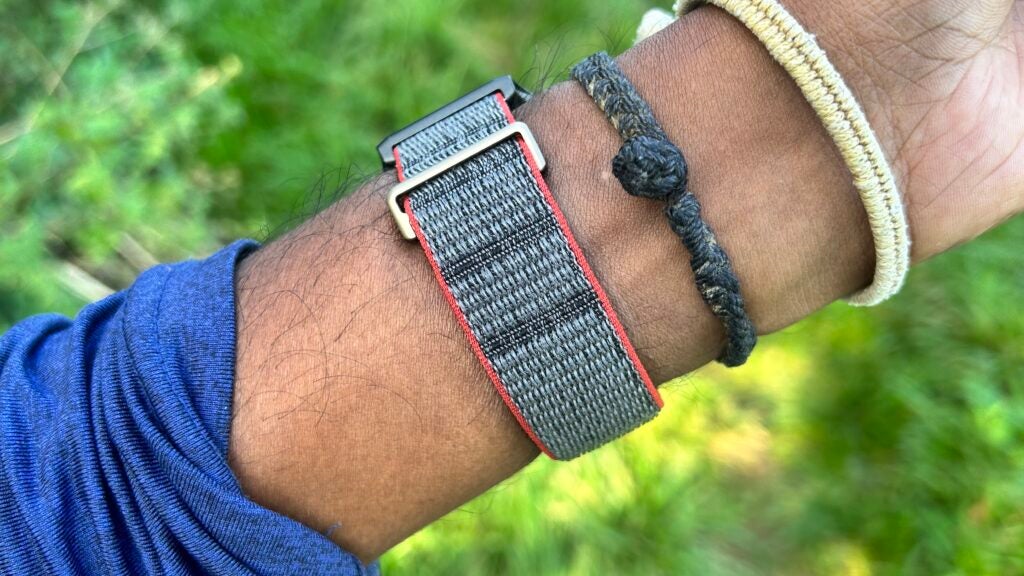
It’s a nice weight too, coming in at just 34g without the strap and 43g with it. The strap is a perfectly comfortable nylon one that, while isn’t the best in class nylon strap I’ve used, hasn’t caused any sort of irritation during runs and can also be easily removed.
To aid that touchscreen navigation the Pro includes just the two physical buttons. The one up top is a twisting crown type, which has been the go-to approach for a lot of smartwatch makers getting into the sports watch space. Below that is a flatter physical one and that’s reserved for jumping quickly into the workout tracking mode.
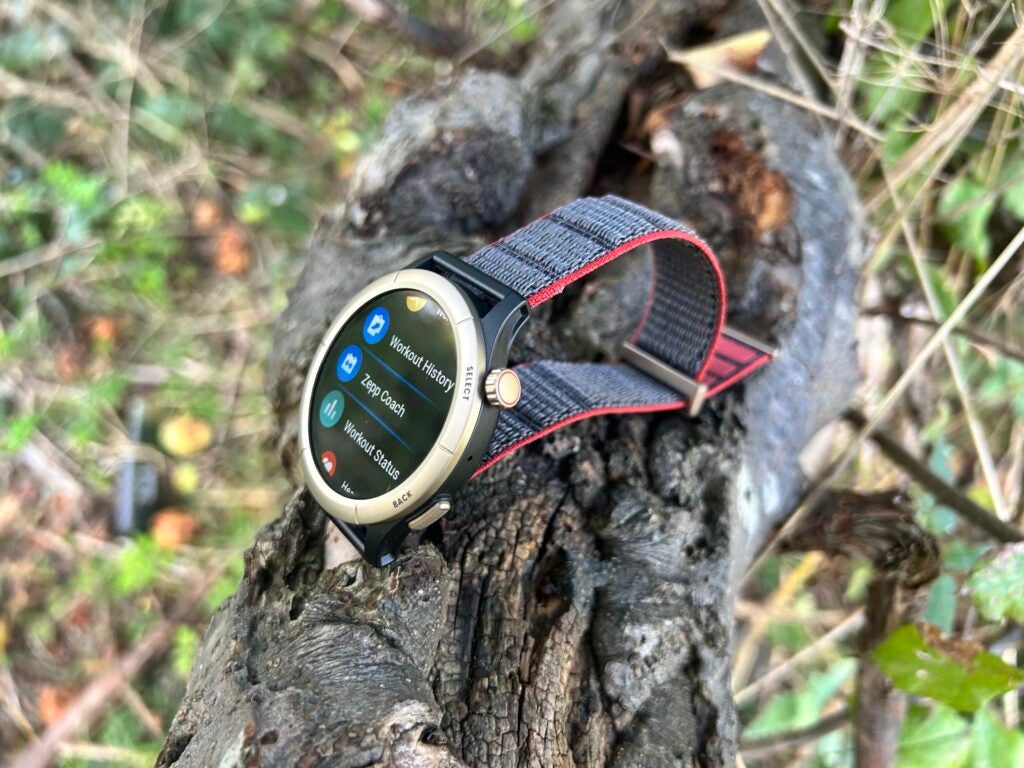
Amazfit has certainly got a lot of things right here with the look and feel. You do only have the one look to pick from, but the case and strap combination works well, offering an attractive watch that crucially has a nicely visible screen and doesn’t feel heavy or bulky to wear.
Software and smartwatch features
- Runs on Zepp OS
- Offers some third party apps
- Offers music player and Bluetooth calls
Amazfit relies on its own Zepp OS to run the software show on the Cheetah Pro and we’re up to version 2.0 now.
The general look of Zepp OS doesn’t scream sophistication and while Zepp doesn’t disclose the chipset powering performance, it does at least run pretty slick. There’s no horrible signs of lag and it doesn’t take long to work out where everything lives on the watch.
Off the watch you’ve got to deal with Zepp’s companion app, which I would describe as busy, especially now with some of the new software features that have been added to it.
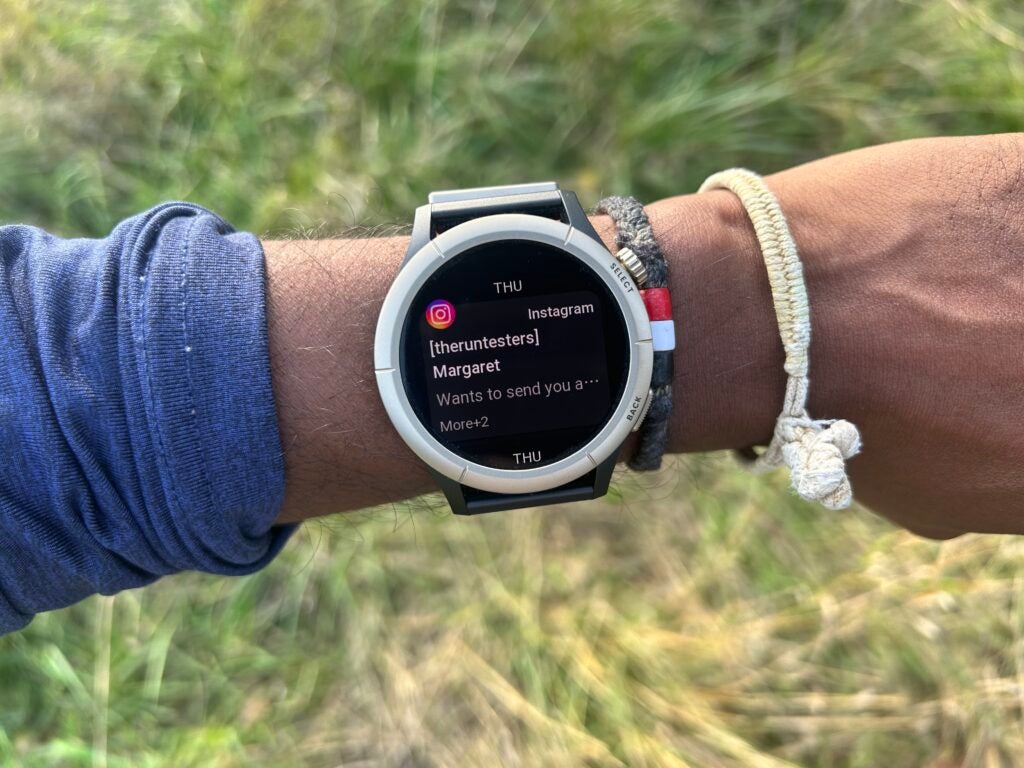
In terms of smartwatch features, the Pro does offer a lot, it’s just a case of how well those features are executed. You can view notifications, though I found notification support a bit spotty in terms of appearing on the watch. There’s a riff on Garmin’s Morning Report feature here too, which gives you a summary of things like battery life, weather and sleep stats.
There’s a built-in music player but you have to upload music via the phone app and then use the built-in speaker or pair up Bluetooth headphones to listen to audio. That speaker is joined by a microphone to let you handle calls over Bluetooth and record voice memos.
Amazon Alexa makes the cut alongside Amazfit’s own offline voice assistant, which gives you hands-free control of key watch features and does work well overall.
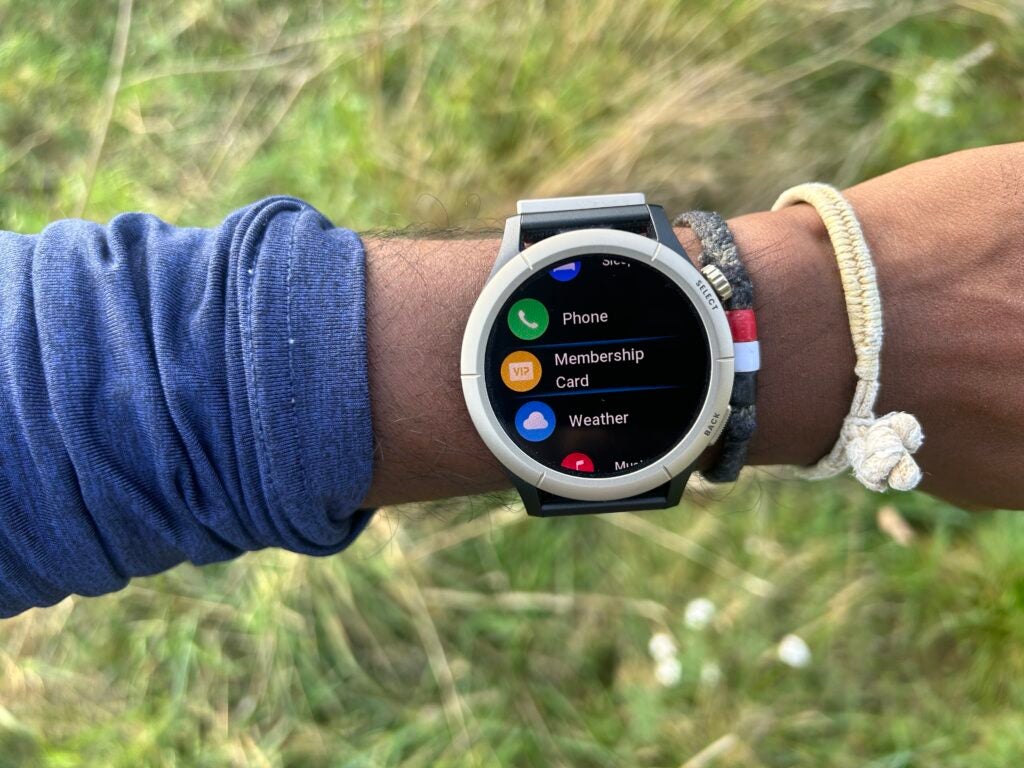
You can add membership cards, but there’s no sign of contactless payments. You also have an app store here too, but I wouldn’t quite call it an app store in the same vein as Apple or Google’s storefronts and has more in common with Huawei’s AppGallery. There’s more native than third party apps. I downloaded a few including Remotify, a music control playback app for Spotify, only to find it was an Android-only app, so there’s some inconsistency in terms of that app support.
Overall, Amazfit offers a lot, but as a package doesn’t feel as slick as watchOS, Wear OS and I’d add Huawei’s HarmonyOS in here too, though there are definitely similarities with the latter in terms of not quite nailing that delivery of a suite of well-connected smartwatch features.
Fitness tracking
- Dual-band GNSS chipset
- Offline maps and breadcrumb navigation
- Zepp AI Coach
While the Amazfit Cheetah Pro is pitched as a running watch, it’s capable of tracking everything from swims to strength training, including rep counting and has over 150 sports modes available.
Running is very much at the core of what makes this watch tick and that’s where the biggest features lie. That includes the inclusion of a dual-band GPS antenna to deliver 99.5% positioning accuracy according to Zepp, in areas that can cause signal interference like running near tall buildings and tall trees.
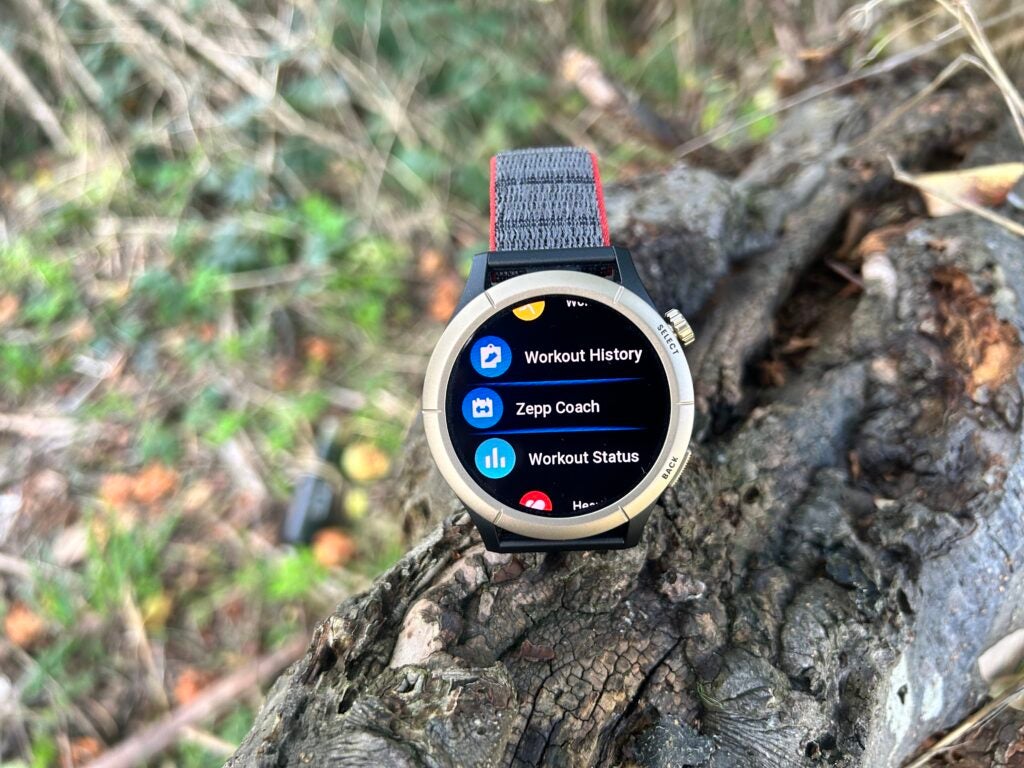
There is also support to upload routes via the Zepp app and then sync over to the watch to use breadcrumb-style navigation to help you explore new running terrain. There’s also the ability to download full maps from different regions over Wi-Fi to add some additional context and detail to that navigation time.
A new Zepp Coach lets you build a running plan where sessions planned are added to the watch with an AI-powered Zepp Chat feature to offer advice and aim to function as your own personalised running coach. This feature however costs £29.99 a year or £3.99 a month to access.
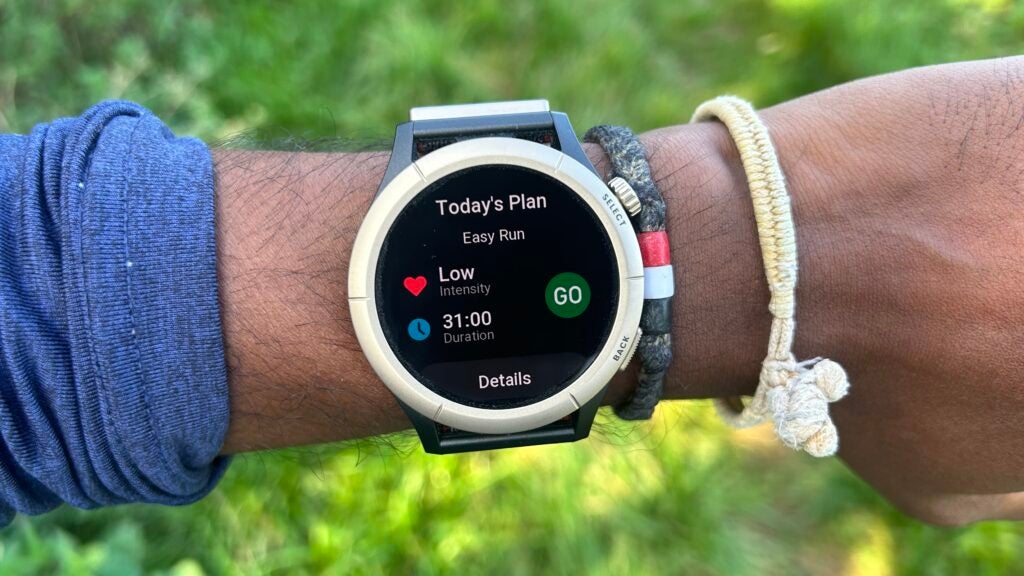
I’ll start with that core run tracking performance, which has been slightly skewed due to the fact that Amazfit issued an update halfway through my testing to address some GPS issues.
Pre-update I ran a one-lap, 5k race against the Garmin Forerunner 965 and generally data and mapped routes matched up, though the Amazfit suggested I’d paused the watch for over a minute and this emphasised some of the odd software quirks I experienced overall with the Cheetah Pro.
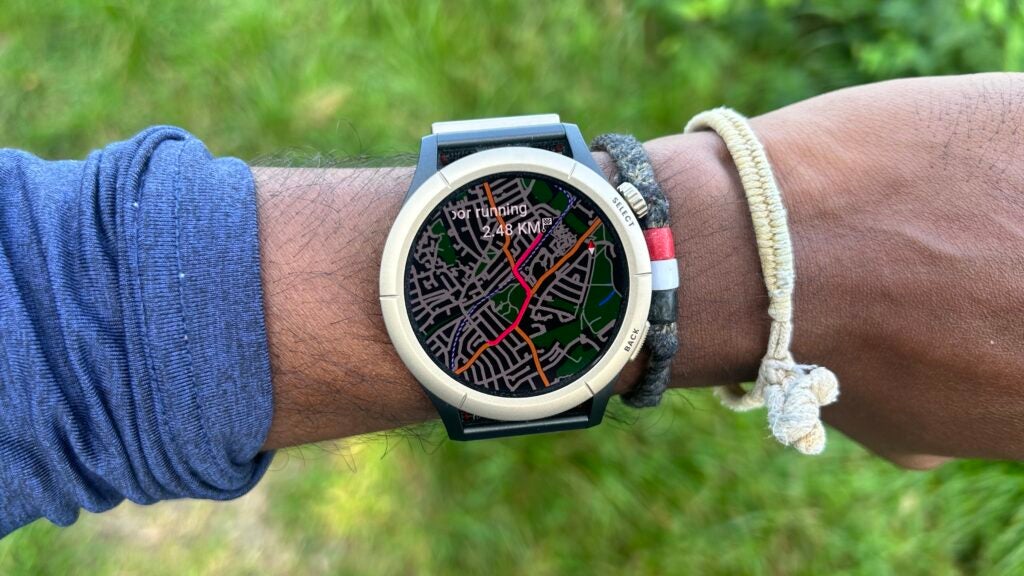
Details like average pace and splits were close enough in comparison. Things weren’t so good on the heart rate front where average and max heart rate readings were around 20 bpm off from a heart rate monitor chest strap. Thankfully you can pair up external heart rate sensors here and heart rate performance was better on steadier paced runs. Generally though, I found the dual-band performance to be very good with some wavering moments that doesn’t quite put it up there with the best dual-band setups.
On top of the core running stats there’s also insights available like training load, VO2 Max estimates and a recovery advisor, which seemed to be nicely in tune with the Garmin I was wearing, which offers good guidance but shouldn’t always be taken as definitive advice.
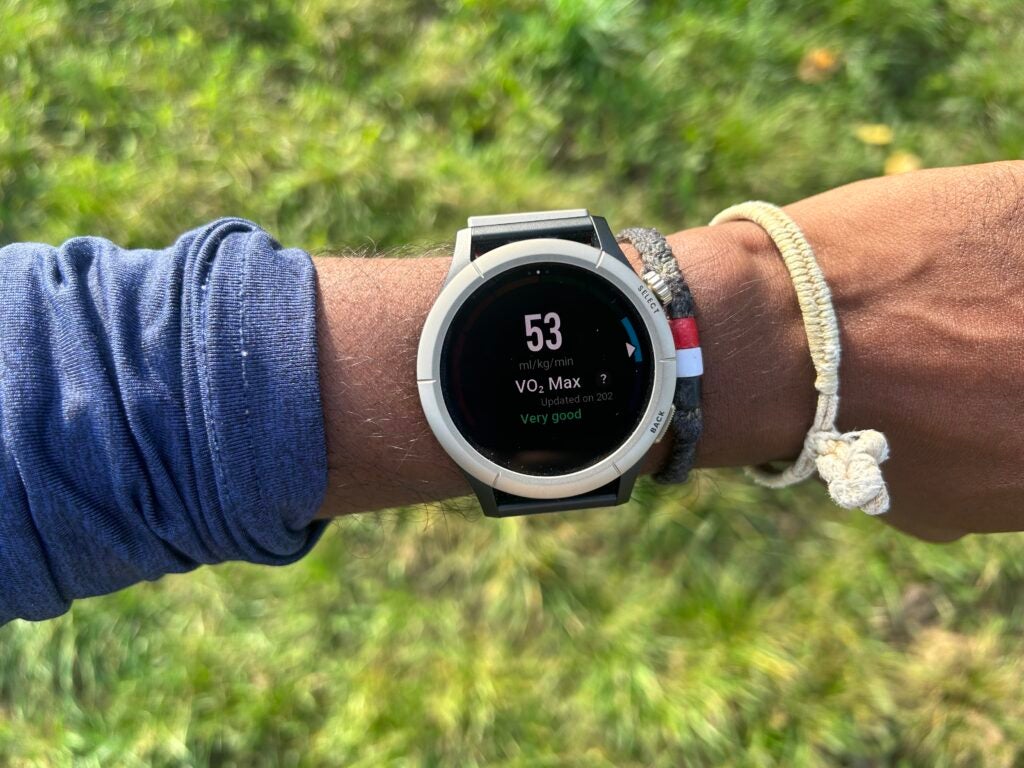
With those mapping and navigation features, syncing maps over to the watch is pretty straightforward. You can view mapping data from one of the data screens during runs where you’ll be able to pick out greener areas and give you some added detail. Uploading routes to follow is done via the My Route menu on the phone app, which is tucked away and lets you sync over GPX files and previous runs. It’s simple, lacks turn-by-turn navigation, but will let you know when you’ve strayed off course.
Zepp’s coach is a good addition in principle, though again I found some issues with it. It wouldn’t let me build a plan for a race a few months away as it didn’t deem it enough time to train for it. It presents training sessions in a digestible manner on the watch, but the AI-powered Zepp Chat feature didn’t feel hugely useful and at times did things like reply in different languages to some basic questions. Again, more quirks and bugs.
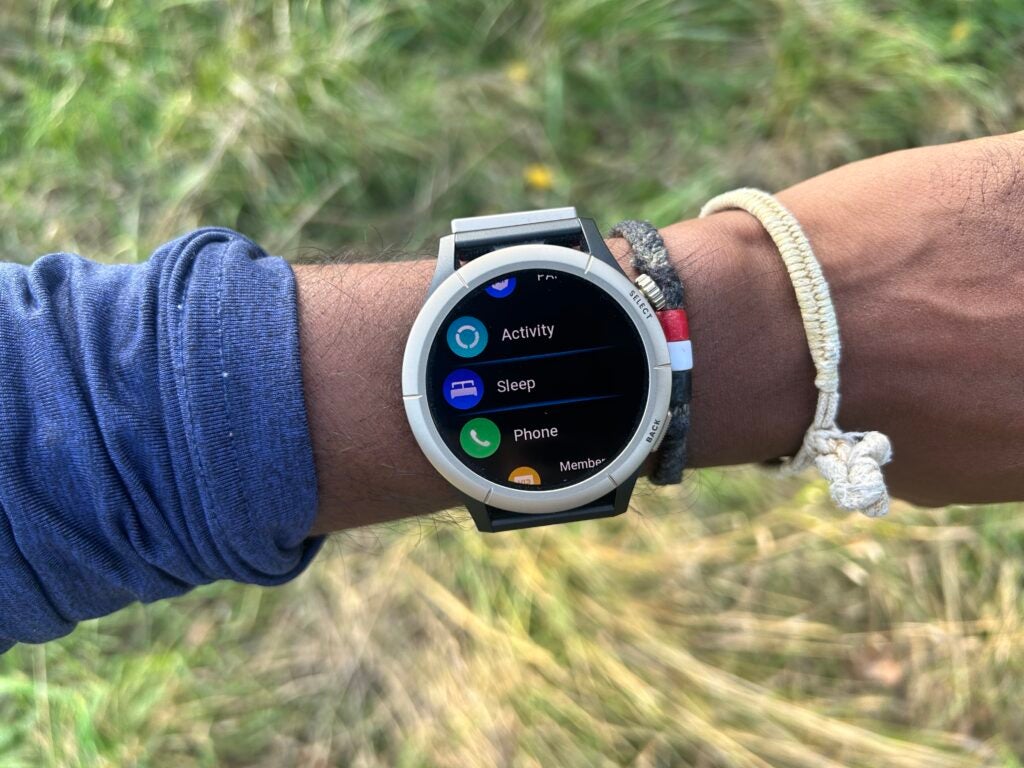
Outside of sports tracking, it does perform like a fitness tracker and will also record heart rate continuously, blood oxygen levels, daily step counts and sleep breathing quality. Sleep tracking has its own dedicated page on the Zepp app presenting data like sleep scores, time you fell asleep, sleep regularity and sleep stages. I used it alongside the Oura Ring Gen 3 and found it recorded similar sleep duration, sleep scores and actually delivered more reliable sleep heart rate data as well.
Battery life
- Up to 14 days in smartwatch mode
- Up to 7 days in heavy usage
- 28 hours in top GPS accuracy mode
With Amazfit’s watches in general, battery life has been a positive and that doesn’t change with the Cheetah Pro.
There’s a 440mAh capacity battery packed in that can deliver up to 14 days in typical usage, which drops to 7 days in heavy usage. That would be when using features like all of the continuous health monitoring smarts and the top GPS accuracy mode.
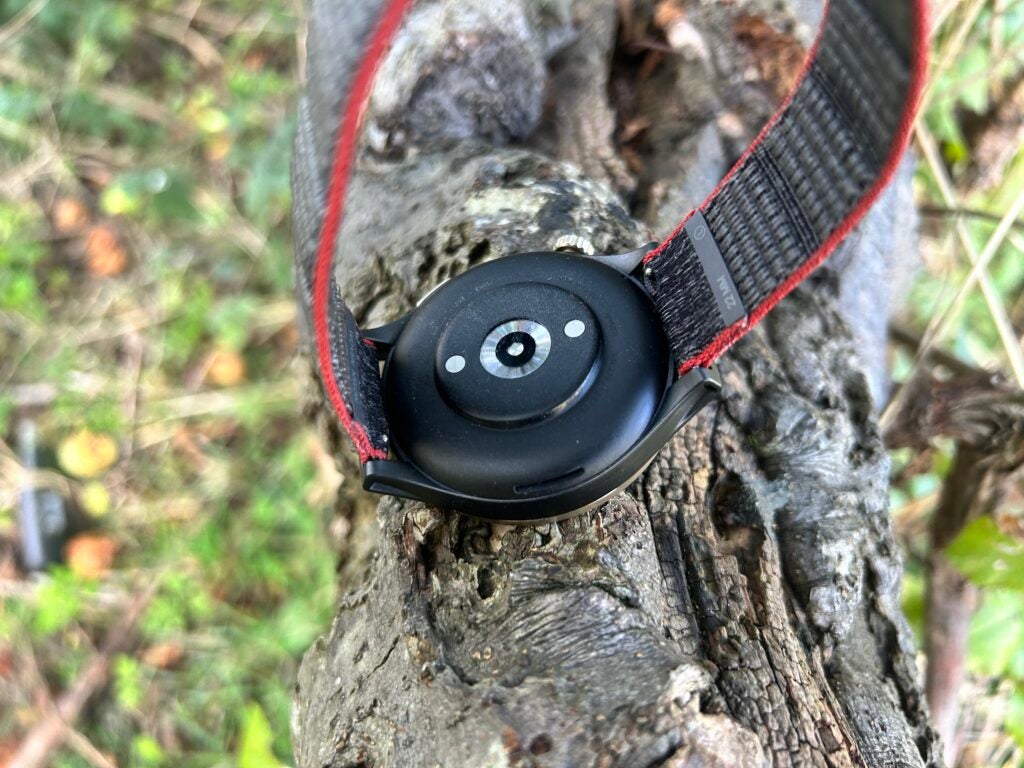
It does include additional modes like a battery saver mode that gives you up to 24 days and a basic watch mode that gives you 45 days.
When you factor in GPS tracking in the top accuracy mode you’ll get 26 hours, which jumps to 44 hours in the standard GPS mode and up to 54 hours in the power saving GPS mode.
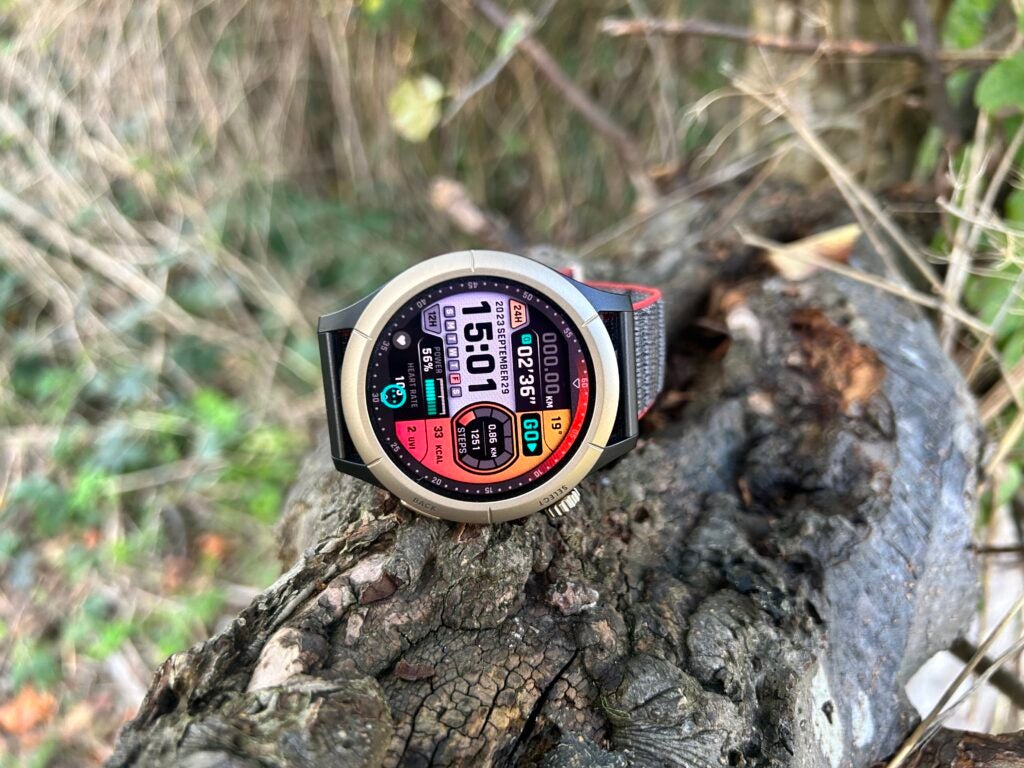
I’d say those numbers largely reflect my time with the Cheetah Pro. An hour’s running on a treadmill saw battery drop by less than 5%, a 20-minute track session saw battery drop by 5% in the top accuracy mode and daily battery drop off with some workout tracking and continuous health monitoring in use saw it last on average a week.
Bottom line, this is a watch that can last for a week and go longer, depending on what features are in regular use.
Latest deals
Should you buy it?
You want a good value running watch with mapping and navigation
The Amazfit Cheetah Pro offers good features for the price and that largely deliver on the performance and accuracy front
You want the best running watch at this price
While the Cheetah Pro packs in a lot, you can arguably get a slicker overall run tracking performance from watches like the Pacer Pro and Forerunner 255 and even the cheaper Coros Pace 3.
Final Thoughts
Amazfit’s entry into the running watch space reminds me a lot of when Huawei did something similar with the GT Runner. That watch got a lot of things right on the design, performance and features front and arguably offered a much slicker software approach to the Cheetah Pro.
Where the comparisons stop is with the Cheetah Pro’s software, which is just a bit buggy in places. If those bugs and quirks can be addressed, Amazfit might have something here one day. Right now, it’s not quite there and a start might be to strip things back a little. Check out our Best Fitness Tracker guide for more options.
How we test
We thoroughly test every fitness tracker we review. We use industry standard testing to compare features properly and we use the watch as our main device over the review period. We’ll always tell you what we find and we never, ever, accept money to review a product.
FAQs
The Amazfit Cheetah Pro offers the same features as the Cheetah Round and mainly differs with the design and the higher quality materials used.
Yes, the Amazfit Cheetah Pro is compatible with iPhones, though some features like call quick reply and some native apps are only available when paired to Android phones.
Verdict
The Amazfit Cheetah Pro is a solid first attempt at a dedicated running watch that crams in a lot of features into an attractive and comfortable design. If Amazfit can get that software looking as good as the hardware then it might have a bit of a winner here. Right now, it needs a bit of finessing to compete with the running watch elite.
Pros
- Nice look and comfortable to wear
- GPS tracking performance
- Good battery life
Cons
- Heart rate at high intensity
- Some off software quirks
- Busy watch software and companion app
-
150+ sports modesGreat variety of sports modes, incluing outdoor running, treadmill, traithalon, HIIT and more.
Introduction
The Amazfit Cheetah Pro is Amazfit’s first attempt at making a watch for runners. Joining the Cheetah Round and Square, the Pro sits at the top of that trio, offering a bigger screen and nicer design materials.
The features available for runners are basically the same as the cheaper Cheetah, including a dual-band GPS antenna for improved outdoor tracking accuracy, the ability to upload routes, access to the AI-powered running coach and all the metrics you’d expect to find.
At £299.90/$300, it’s competing with running watches like the Garmin Forerunner 255 and the Polar Pacer Pro. I can also factor in watches like the Huawei Watch GT Runner. So it’s got some competition to be crowned the best midrange running watch. Does it deliver the goods? Here’s my take.
Design and screen
- AMOLED with up to 1000 nits brightness
- Titanium alloy bezel
- Waterproof up to 50 metres
The first good thing about the Cheetah Pro is that it doesn’t feel like a carbon copy of other running watches. Yes, there are elements that are similar, like materials used, but it does feel like an attractive running watch in a mostly unique way.

You’re getting a 47mm polymer case with a pretty showy titanium alloy bezel on top, surrounding a nice-sized and good quality 1.45-inch, 480 x 480 AMOLED touchscreen display.
It promises up to 1000 nits of brightness so is not as bright as the latest Apple Watch Ultra 2, but still ensures visibility overall in most conditions is very good. That’s protected with Corning Gorilla Glass 3 and as a package is waterproof up to 50 metres.

It’s a nice weight too, coming in at just 34g without the strap and 43g with it. The strap is a perfectly comfortable nylon one that, while isn’t the best in class nylon strap I’ve used, hasn’t caused any sort of irritation during runs and can also be easily removed.
To aid that touchscreen navigation the Pro includes just the two physical buttons. The one up top is a twisting crown type, which has been the go-to approach for a lot of smartwatch makers getting into the sports watch space. Below that is a flatter physical one and that’s reserved for jumping quickly into the workout tracking mode.

Amazfit has certainly got a lot of things right here with the look and feel. You do only have the one look to pick from, but the case and strap combination works well, offering an attractive watch that crucially has a nicely visible screen and doesn’t feel heavy or bulky to wear.
Software and smartwatch features
- Runs on Zepp OS
- Offers some third party apps
- Offers music player and Bluetooth calls
Amazfit relies on its own Zepp OS to run the software show on the Cheetah Pro and we’re up to version 2.0 now.
The general look of Zepp OS doesn’t scream sophistication and while Zepp doesn’t disclose the chipset powering performance, it does at least run pretty slick. There’s no horrible signs of lag and it doesn’t take long to work out where everything lives on the watch.
Off the watch you’ve got to deal with Zepp’s companion app, which I would describe as busy, especially now with some of the new software features that have been added to it.

In terms of smartwatch features, the Pro does offer a lot, it’s just a case of how well those features are executed. You can view notifications, though I found notification support a bit spotty in terms of appearing on the watch. There’s a riff on Garmin’s Morning Report feature here too, which gives you a summary of things like battery life, weather and sleep stats.
There’s a built-in music player but you have to upload music via the phone app and then use the built-in speaker or pair up Bluetooth headphones to listen to audio. That speaker is joined by a microphone to let you handle calls over Bluetooth and record voice memos.
Amazon Alexa makes the cut alongside Amazfit’s own offline voice assistant, which gives you hands-free control of key watch features and does work well overall.

You can add membership cards, but there’s no sign of contactless payments. You also have an app store here too, but I wouldn’t quite call it an app store in the same vein as Apple or Google’s storefronts and has more in common with Huawei’s AppGallery. There’s more native than third party apps. I downloaded a few including Remotify, a music control playback app for Spotify, only to find it was an Android-only app, so there’s some inconsistency in terms of that app support.
Overall, Amazfit offers a lot, but as a package doesn’t feel as slick as watchOS, Wear OS and I’d add Huawei’s HarmonyOS in here too, though there are definitely similarities with the latter in terms of not quite nailing that delivery of a suite of well-connected smartwatch features.
Fitness tracking
- Dual-band GNSS chipset
- Offline maps and breadcrumb navigation
- Zepp AI Coach
While the Amazfit Cheetah Pro is pitched as a running watch, it’s capable of tracking everything from swims to strength training, including rep counting and has over 150 sports modes available.
Running is very much at the core of what makes this watch tick and that’s where the biggest features lie. That includes the inclusion of a dual-band GPS antenna to deliver 99.5% positioning accuracy according to Zepp, in areas that can cause signal interference like running near tall buildings and tall trees.

There is also support to upload routes via the Zepp app and then sync over to the watch to use breadcrumb-style navigation to help you explore new running terrain. There’s also the ability to download full maps from different regions over Wi-Fi to add some additional context and detail to that navigation time.
A new Zepp Coach lets you build a running plan where sessions planned are added to the watch with an AI-powered Zepp Chat feature to offer advice and aim to function as your own personalised running coach. This feature however costs £29.99 a year or £3.99 a month to access.

I’ll start with that core run tracking performance, which has been slightly skewed due to the fact that Amazfit issued an update halfway through my testing to address some GPS issues.
Pre-update I ran a one-lap, 5k race against the Garmin Forerunner 965 and generally data and mapped routes matched up, though the Amazfit suggested I’d paused the watch for over a minute and this emphasised some of the odd software quirks I experienced overall with the Cheetah Pro.

Details like average pace and splits were close enough in comparison. Things weren’t so good on the heart rate front where average and max heart rate readings were around 20 bpm off from a heart rate monitor chest strap. Thankfully you can pair up external heart rate sensors here and heart rate performance was better on steadier paced runs. Generally though, I found the dual-band performance to be very good with some wavering moments that doesn’t quite put it up there with the best dual-band setups.
On top of the core running stats there’s also insights available like training load, VO2 Max estimates and a recovery advisor, which seemed to be nicely in tune with the Garmin I was wearing, which offers good guidance but shouldn’t always be taken as definitive advice.

With those mapping and navigation features, syncing maps over to the watch is pretty straightforward. You can view mapping data from one of the data screens during runs where you’ll be able to pick out greener areas and give you some added detail. Uploading routes to follow is done via the My Route menu on the phone app, which is tucked away and lets you sync over GPX files and previous runs. It’s simple, lacks turn-by-turn navigation, but will let you know when you’ve strayed off course.
Zepp’s coach is a good addition in principle, though again I found some issues with it. It wouldn’t let me build a plan for a race a few months away as it didn’t deem it enough time to train for it. It presents training sessions in a digestible manner on the watch, but the AI-powered Zepp Chat feature didn’t feel hugely useful and at times did things like reply in different languages to some basic questions. Again, more quirks and bugs.

Outside of sports tracking, it does perform like a fitness tracker and will also record heart rate continuously, blood oxygen levels, daily step counts and sleep breathing quality. Sleep tracking has its own dedicated page on the Zepp app presenting data like sleep scores, time you fell asleep, sleep regularity and sleep stages. I used it alongside the Oura Ring Gen 3 and found it recorded similar sleep duration, sleep scores and actually delivered more reliable sleep heart rate data as well.
Battery life
- Up to 14 days in smartwatch mode
- Up to 7 days in heavy usage
- 28 hours in top GPS accuracy mode
With Amazfit’s watches in general, battery life has been a positive and that doesn’t change with the Cheetah Pro.
There’s a 440mAh capacity battery packed in that can deliver up to 14 days in typical usage, which drops to 7 days in heavy usage. That would be when using features like all of the continuous health monitoring smarts and the top GPS accuracy mode.

It does include additional modes like a battery saver mode that gives you up to 24 days and a basic watch mode that gives you 45 days.
When you factor in GPS tracking in the top accuracy mode you’ll get 26 hours, which jumps to 44 hours in the standard GPS mode and up to 54 hours in the power saving GPS mode.

I’d say those numbers largely reflect my time with the Cheetah Pro. An hour’s running on a treadmill saw battery drop by less than 5%, a 20-minute track session saw battery drop by 5% in the top accuracy mode and daily battery drop off with some workout tracking and continuous health monitoring in use saw it last on average a week.
Bottom line, this is a watch that can last for a week and go longer, depending on what features are in regular use.
Latest deals
Should you buy it?
You want a good value running watch with mapping and navigation
The Amazfit Cheetah Pro offers good features for the price and that largely deliver on the performance and accuracy front
You want the best running watch at this price
While the Cheetah Pro packs in a lot, you can arguably get a slicker overall run tracking performance from watches like the Pacer Pro and Forerunner 255 and even the cheaper Coros Pace 3.
Final Thoughts
Amazfit’s entry into the running watch space reminds me a lot of when Huawei did something similar with the GT Runner. That watch got a lot of things right on the design, performance and features front and arguably offered a much slicker software approach to the Cheetah Pro.
Where the comparisons stop is with the Cheetah Pro’s software, which is just a bit buggy in places. If those bugs and quirks can be addressed, Amazfit might have something here one day. Right now, it’s not quite there and a start might be to strip things back a little. Check out our Best Fitness Tracker guide for more options.
How we test
We thoroughly test every fitness tracker we review. We use industry standard testing to compare features properly and we use the watch as our main device over the review period. We’ll always tell you what we find and we never, ever, accept money to review a product.
FAQs
The Amazfit Cheetah Pro offers the same features as the Cheetah Round and mainly differs with the design and the higher quality materials used.
Yes, the Amazfit Cheetah Pro is compatible with iPhones, though some features like call quick reply and some native apps are only available when paired to Android phones.

























